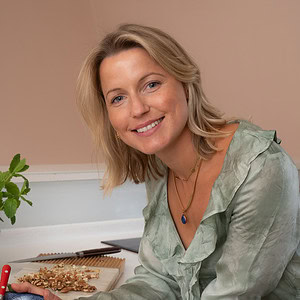Published on 1st February 2018
If you’re looking for a good (nutrition-related!) book, here are four of our top reads from Optimum Nutrition magazine’s Book Therapy pages…
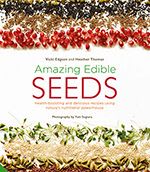
Amazing Edible Seeds
Vicki Edgson and Heather Thomas
Jacqui Small
ISBN: 978-1-84780-925-4
If you usually have edible seeds of some kind lurking in your kitchen, and don’t have a clue as to what to do with them, then this book could be for you. Primarily, as it says on the cover, it is about seeds; the available types, their nutrients, and what they are typically used for. If you would like to produce your own, then there are step-by-step instructions on sprouting, growing and harvesting, too.
The recipes (more than 50 including: Snacks, spreads, dips & drinks; Breakfasts & brunches; Salads & raw dishes; Speedy suppers; and Baking & desserts) are not culinary rocket science, which is ideal for those of us who do not have bags of spare time to faff around with complicated cooking. They are also varied, colourful, and use simple ingredients with alternatives suggested in case you just don’t have that one particular item to hand! With summer approaching, the salad section is especially appealing — with great suggestions for those of us who do not find imaginative salads within their skill set. Beautifully illustrated, too, it could be very appealing for the cook who is stuck in a rut and wants to jazz things up a bit.
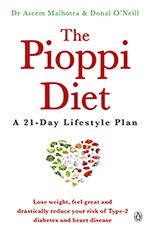
The Pioppi Diet
Dr Aseem Malhotra and Donal O’Neill
Penguin
ISBN: 978-1405932639
Cardiologist Malhotra and filmmaker O’Neill write about what they did on their holiday, visiting the village of Pioppi in Italy, where American physiologist Ansel Keys is reputed to have discovered what later became known as the Mediterranean diet, and had such a lovely time that anyone who reads this book will want to go there, too. But this is only for one chapter and there was a purpose. They eat, speak to locals, observe and, as a result, critique our understanding of the Mediterranean diet within the context of lifestyle, overturning many modern dietary conventions in the process. Malhotra and O’Neill point out that Keys omitted mentioning many lifestyle factors such as skipping meals (he was in Pioppi after the war, during a time of scarcity), movement and relaxation. And it is such lifestyle factors, they assert, that have great benefits to health and longevity.
Those who already know Malhotra’s and O’Neill’s work through the film Cereal Killers will not be surprised that they recommend a low-carbohydrate diet. They unpick the science behind nutrients such as fat and carbs, look at how we can exercise more effectively, and investigate why relaxation is so important. They also describe how they don’t just talk the talk but walk the walk in their own lives, too.
Well-written and readable, this should be an interesting read for anyone who wants to look at different approaches to health and nutrition beyond current government guidelines.
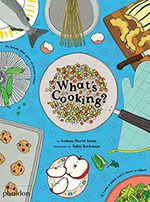
What’s Cooking?
Joshua David Stein
Phaidon Press
ISBN: 978-0714875095
Aimed at children who will be just learning to read, this delightful read-aloud book takes a little journey into the big, wide world of the kitchen with a child’s eye and curiosity, showing how it is possible to experiment with words as well as foods.
“Can I can clams? Can I can jams? Can I jam clams? Clams you can can…” or “If I eat left overs, can I eat left unders?” The food-related questions can be practical or simply whimsical, but — perhaps from a child’s point of view — are very reasonable things to ask; all of which are asked in large, friendly writing and illustrated with homely, jolly drawings.
As with every children’s book there is, of course, a hidden agenda. In this case it isn’t just to get children playing with words, it is to introduce them to the world of food in a simple, fun way, and to get them engaged in food as a wider topic to be explored. One page even gives three different countries’ names for dumplings, introducing children to the concept that food is something that unites cultures.
But be prepared. If your little one does have their curiosity truly piqued you may find yourself having to experiment in the kitchen — yes, you can fry gelato, Stein tells his readers. So good luck with that one! But a definite bonus is that there is also the opportunity to talk about who gets to do the washing up, too, and it’s never too early to start with that!
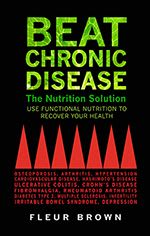
Beat Chronic Disease: The Nutrition Solution?
Fleur Brown
Hammersmith Health Books
ISBN: 9781781611043
This book offers a fabulous insight into the functional nutrition approach to chronic illness, which is being adopted by a growing number of nutritional therapists (and other health practitioners) in the UK. It guides the reader through what is, essentially, a nutritional therapy consultation, using four case studies to show how diet and lifestyle modifications can help alleviate and even resolve a wide range of symptoms associated with chronic health conditions. Brown, an alumna of the Institute for Optimum Nutrition, shows how functional tests and detailed case histories are utilised to identify the underlying causes of ill-health — such as poor diet, high stress, poor digestive health, an imbalanced microbial profile, etc. She also details the nutritional protocols that she used to get her clients back to better health.
Section one focuses more on describing the concept of functional nutrition and offering case studies. Section two is more a practical guide to help readers address their own health problems — a mini-consultation of sorts — with information on how to follow an elimination diet, a list of actions to consider, and an overview of the principles of a lifelong eating plan. The book is intended for anyone suffering with chronic health concerns who wants to take control of their health. As a nutritional therapist myself, I really liked the fact that the whole process of nutritional therapy was conveyed as a journey — not a quick fix; and I think the book does an exceptional job at showing how good nutrition (with other lifestyle factors) can profoundly benefit our health.
Read more articles and recipes





